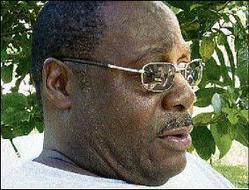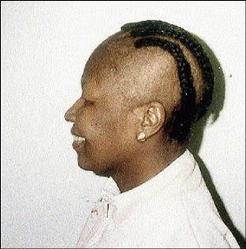Paul H.Williams, Gleaner Writer


Raymond Kirlew as he reflects.
When Yvonne Kirlew was diagnosed with lymph node cancer at the end of 2002, it was her husband, Raymond, who first accepted the reality and was determined to get her treated. Yvonne thought of taking another teaching job, but her husband said, “No, don’t. Let’s concentrate on your health.”
In January 2003, he took the family on a cruise. On their return, doctors told Raymond his wife would have to undergo chemotherapy immediately to treat non-Hodgkin’s lymphoma. A nurse friend of his told him about the destructive effects of chemotherapy – to mind and body – as it attempts to kill cancer cells, but the Kirlews never imagined just how devastating. It was almost nine months of suffering for Yvonne, and anxiety for Raymond.
Wracked with pain
Right after the first treatment, Yvonne got very sick. For the most part, she could hardly move and her body was wracked with pain. There were sores all over – even in her mouth – fainting spells, blood transfusions, low blood count, and emergency-room visits/hospitalisation. Eventually, all her hair fell out, and her nails became blackish-brown and scaly. Her skin looked like a “crocodile’s”.
At one point, Yvonne thought she was on the brink of death, so she started to prepare her own funeral, even identifying her burial dress. She also drafted a funeral programme. Recollecting, she said, “I picked the songs that I would love (them) to sing in (a particular) sequence, what (Bible) verses I wanted read. I have it all written down.”
Raymond was disturbed. He said, “I didn’t want to hear it, I didn’t want to have any negative thought. Because I think I’m gonna do the best I can for her. I think somewhere down the back of my mind, if this is gonna work out, I have to be optimistic. Because I couldn’t think of losing her; I couldn’t see myself living without her.”
But Raymond’s love for her was not ready for any eulogy, lesson, dirge, pretty burial dress, funeral. So when she was in the hospital at one stage and not enjoying the food, it was Raymond to the rescue.
Unhappy
“I was unhappy because I couldn’t get a good meal, and the only time I felt good was when my husband used to cook and bring me something. Even if I knew I was gonna pass, at least I was content to know that I was enjoying my meals, and I feel better because I had people around me to talk to, whom I can rely on.”
Because of Yvonne’s severely weakened immune system, her body was left virtually defenceless against bacterial and viral infections. The very food she ate could have killed her. Everything she consumed was carefully selected and cooked. Even her fruit juices had to be boiled. Fresh fruits were a no-no. And, so were pollen, dust mites, dander, polluted air, etc.
“I bought a thing they called Ionic Air, which suck out everything in the room, and I keep that room shut, and leave that little machine on 24/7 ... and that’s where I lock her in, like she is a prisoner in there. I feed her in that room; I bathe her in that room; I treat her in that room,” he said, voice oozing pride.

Yvonne’s partial hair loss during chemotherapy.
Was therapy working
Despite Raymond’s efforts, the chemo seemed to be taking Yvonne quicker to her grave than thecancer would have. He got quite “desperate and frustrated” during one of Yvonne’s near brushes with death, when the doctor simply suggested taking her home with some Tylenol, and back to the hospital should an emergency occur.
He brought her home as advised, but “she was tossing in the bed; she was in pain, and she was restless, groaning and moaning, and I thought, ‘She was gonna die’.” He actually believed she was going to die. He said, “I felt really scared, and I said, ‘You know something, let’s make one more try, let’s go to the hospital.”
Yvonne said, “No, wait until tomorrow.”
Raymond retorted, “No, tomorrow is gonna be too late; come, let’s go now.”
Yvonne acquiesced. He bathed and dressed her, lifted her to the car and took her to the emergency room, again.
There medics took her vitals and wheeled her away immediately. For five days, she was in the emergency room, sealed off in a corner. Her blood was “flushed out”;Another transfusion was done, and she was placed under continual observation, “24/7 monitoring”.
She was eventually moved to the cancer ward, where she spent another two weeks. She pulled through, but had to make weekly, then twice-weekly visits for progress reports. Yvonne was getting better, and Raymond was “very happy”. Their efforts seemed to be paying off, after nine months of pain, fear, frustration, tense moments and Raymond’s determination, which was strongly demonstrated at a Thanksgiving dinner at Yvonne’s sister’s house.
The announcements
It was a time when Raymond was convinced Yvonne had cancer, but Yvonne wasn’t. So she said nothing to relatives, even though she was losing weight. At the dinner table, relatives complimented Yvonne on her weight loss. Suddenly, Raymond chipped in and said, “She is losing weight, not because she wants to lose weight; she’s losing weight because she has cancer.”
They rubbished his claim. How could he have said that? He was chided for being so ‘brawling”. But why did he make the grand announcement? He was resolute in his defence.
He told them, “Let me tell you something, she has cancer, and she has to face it, and in order for her to face it, and in order for her to get better, she has to accept the fact that she has cancer, and all of you, if you want to help her, accept the fact that she has cancer, and we can move on and get her better.”
Appalled
Yvonne herself didn’t like his broadcast because “I know what my family is like and I know they don’t like to publicise bad news; they don’t want to hear it until we know for sure”. So, she was “appalled that he came out and actually (said it), knowing the type of people we were dealing with”.
But Raymond has absolutely no apology for his divulgence. He reasoned, “Once we know that we are ill, we need to accept the fact that we are ill, and we are going to seek the best help we can, and whatever support we can get from family and friends would be welcome. But it’s no use to hide behind a smokescreen to say, I’m fine when you are not fine.”
Yvonne seems to be fine now, though. She has been cancer free since December 2004. Bone marrow samples were removed from her hip, frozen and flown to Washington, D.C. to make a cancer vaccine specially for her. She got the first dose in January 2005, and subsequent doses every month for four months. If the vaccine doesn’t work, there’s a strong possibility that the cancer will return. For now, they are enjoying early retirement in Discovery Bay, St. Ann.
In retrospection, Raymond Kirlew said, “I would do it a million times to save her life ... hopefully, we won’t have to do it again.” Because she’s his lover, friend and soulmate. And about the man, whose friends affectionately referred to him as Ol’ Hog, Yvonne said, “I love him. I’ve always loved him. From the minute I met him, I just knew that we should be together. Thank God, he was thinking the same.”
paul.williams@gleanerjm.com

